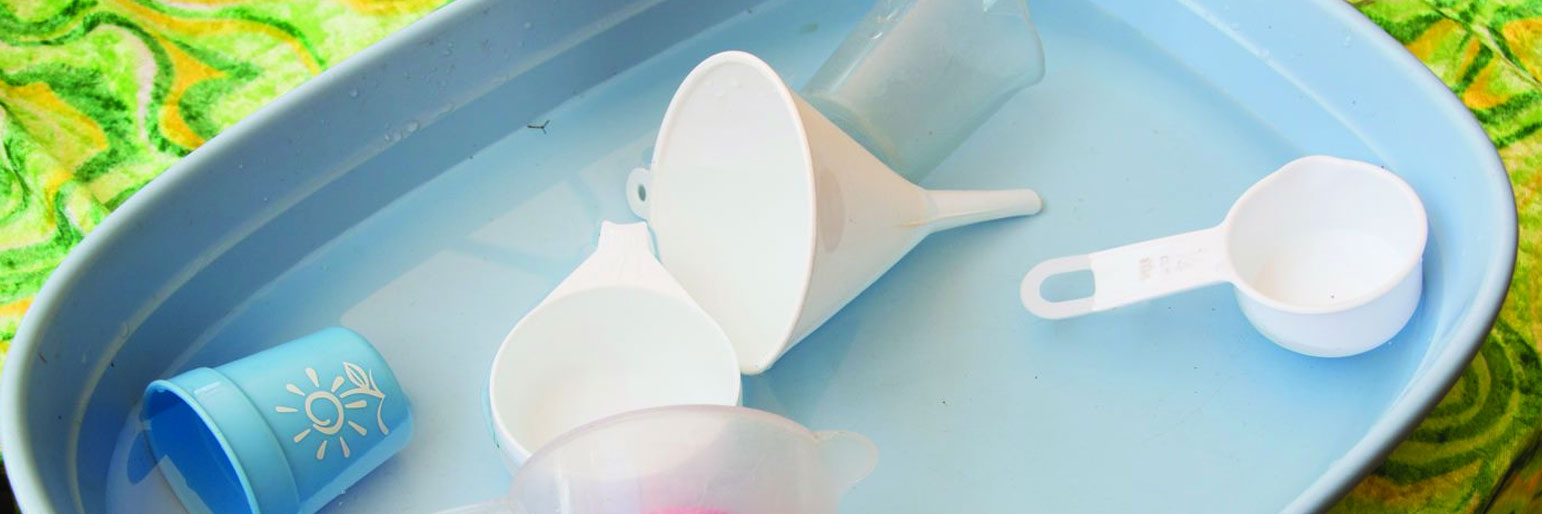Water play
Playing together
Water play enhances children’s learning through discovery.

Activity
Use a water trough or large bowls of water for children to play with. Add tools and materials like cups, jugs, sponges, colanders, spoons.
TIPS:
- Waterproof smocks and a towel for drying arms should be available to encourage reluctant children (or parents/carers) to have a go.
- Ask parents/carers to bring in a change of clothes. Make sure the ground you set up on isn’t slippery when wet (lawn, brick pavers, concrete are good). Otherwise put towels on the floor under the trough or table.
- Ensure children are supervised at all times.
What you'll need
- Big water trough or 2-4 trays with shallow water in small, individual trays (kitty litter trays work well) with a choice of:
- sinking and floating toys
- animals
- dinosaurs
- boats/transport
- kitchen utensils
- tea set (see extensions and variations to this activity section below for more ideas).
- Waterproof smocks, towels
- Small containers, sponges, cups, funnel and jugs
TIP: The shallow trays allow for individual play, can be less wet for cooler months and can be brought inside (with towels or rubber matting on the floor for non-slip surface).
Words to use
- Pour, sprinkle, drip, drop
- Splash, bubbles, froth
- Foam, soak, mist
- Evaporate, dissolve
- Freeze, absorb, wet
Questions to discuss
- What happens when we add colouring or bubbles to the water?
Learning through play
Ways to develop numeracy through play
- Children will begin to experiment with measurement and change – more/less, full/empty, frozen/liquid.
- Fractions – half, quarter, full.
- Experimentation and comparison – float/sink, heavy/light, more/less, clean/dirty, deep/shallow, in/out, rise/fall, cold/warm, wet/dry.
- Notice and even measure change – how long it takes for a puddle to dry, or what happens when you wipe a tea towel on a wet bowl.
- Sing One, two, three, four, five, once I caught a fish alive.
Ways to develop literacy through play
- Introduce new language (see ‘Language to use’ section above).
- Learn about the world around them by using new items... funnel, eggbeater, cork, measuring cup, whisk, detergent, sponges.
- Read books about water:
- Who Sank the Boat? by Pamela Allen
- The Waterhole by Graeme Base
- Tiddalik the Frog – an Aboriginal Dreaming Story.
- Sing songs about water:
- Rain is Falling Down
- Slippery Fish
- Row, Row, Row Your Boat
- Mr Frog Jumped Out of the Pond One Day.
Extensions and variations to this activity
- Big water trough with:
- sinking and floating toys
- animals
- dinosaurs
- boats/transport
- kitchen utensils
- tea set.
- Water in the sandpit (or mudpit!).
- Natural materials – pinecones, leaves, stones, flowers, feathers.
- Water in a bucket with a paintbrush for outdoor painting.
- Washing dolls in doll baths.
- Home corner – washing dishes, washing clothes to peg on a line, tea party with water in the kettles.
- Routines – washing dishes after fruit or cooking, washing hands, wiping tables, cleaning toys.
- Add interest with a splash of food colouring, bubble bath or dishwashing detergent.
- Freeze some water in ice cubes with food colouring and watch them melt in the water.
Supporting parent engagement in play
Play prompts:
- I wonder what happens when different things get wet –
- Will they float or sink?
- Will they make bubbles or a noise?
- Will they still float when I make waves?
Parents or carers can:
- Comment on what their children are doing (say what you see).
- Talk in their home language.
- Use literacy and numeracy words (see words to use section above).
- Talk about what is happening and why during routines – “We are washing our hands so they are nice and clean for fruit time.” “The soapy water helps sponge to get all the paint off the easel.”
You can help families by:
- Modelling what you want them to do.
- Talking to them about the focus of the activity and what children might be learning.
- Writing up words that go with the activity.
- Making suggestions on what families can do at home.
Related Great Start activities
Great Start activities are for parents and carers to do with their children.


